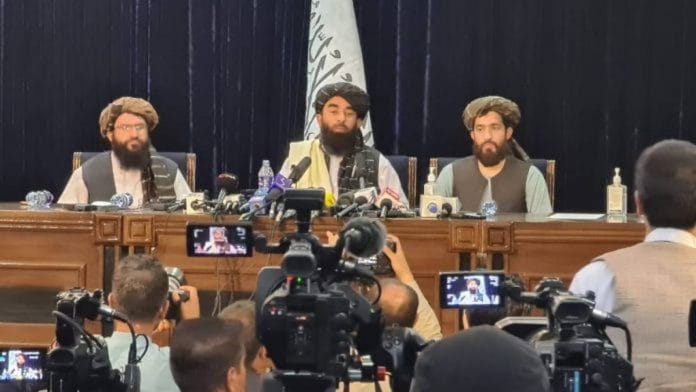New Delhi: The Taliban completed the formation of their interim government Tuesday, by appointing several more cabinet ministers, but failed to include any women in the list.
Two veteran Taliban leaders who were rewarded with key positions in Tuesday’s list were Sadr Ibrahim — who was made Deputy Minister of Interior — and Mullah Abdul Qayyum Zakir — the Deputy Minister of Defense.
The Taliban also announced the appointment of Nazar Mohammad Mutmaen as acting head of the National Olympic Committee.
According to 1TVNewsAF, a television news channel in Afghanistan, the other new appointees were Eng. Najibullah, who was given the post of atomic energy chief, and Dr Qalandar Ebad, the acting minister of health.
Eng. Najibullah appointed as atomic energy chief: Taliban spokesman
— 1TVNewsAF (@1TVNewsAF) September 21, 2021
Two local businessmen also appeared on the list. Mohammad Bashir, a businessman from Baghlan, and Nooruddin Azizi, a businessman from Panjshir, were appointed as deputy minister of commerce and acting minister of commerce respectively.
According to a report by Reuters, the Taliban Tuesday also named Suhail Shaheen as Afghanistan’s UN ambassador and requested the UN Secretary-General Antonio Guterres to allow the new government to address the annual high-level meeting of the General Assembly. Farhan Haq, Guterres’ spokesperson, has said a nine-member committee will discuss the matter, but said the team won’t be able to come up with a decision before Monday when the session ends.
Also read: Taliban bans IPL broadcast in Afghanistan over presence of ‘female spectators’
Few ethnic minorities, no women
While Tuesday’s appointments included two acting ministers and eleven deputy ministers, very few of these positions were given to people from the ethnic minorities such as Tajiks, Uzbeks, and Hazaras.
In a press conference Tuesday, Taliban spokesperson Zabihullah Mujahid pointed out that the deputy defense minister is an Uzbek and that at least two of the appointees were Tajik. The new deputy health minister belongs to the Hazara community.
The Taliban had first announced an all-male interim government earlier this month that included no one from outside the militant group, with about 90 per cent of spots going to ethnic Pashtuns. It was also all male.
The failure to include a single woman even in Tuesday’s list, despite calls for it from the international community, is likely to have an impact on the size of foreign aid to the country.
Ignoring the demand for an inclusive government, Mujahid said, “It is the responsibility of the United Nations to recognize our government (and) for other countries, including European, Asian and Islamic countries, to have diplomatic relations with us”.
The first round of appointees mostly had people who were part of the Taliban leadership from 1996 to 2001. Many of these leaders however are listed in the UN Sanctions List, including the prime minister Mullah Mohammad Hassan Akhund, the two deputy prime ministers, and the foreign minister.
(Edited by Poulomi Banerjee)
Also read: Support for Taliban in Pakistan goes beyond military and maulvis now






